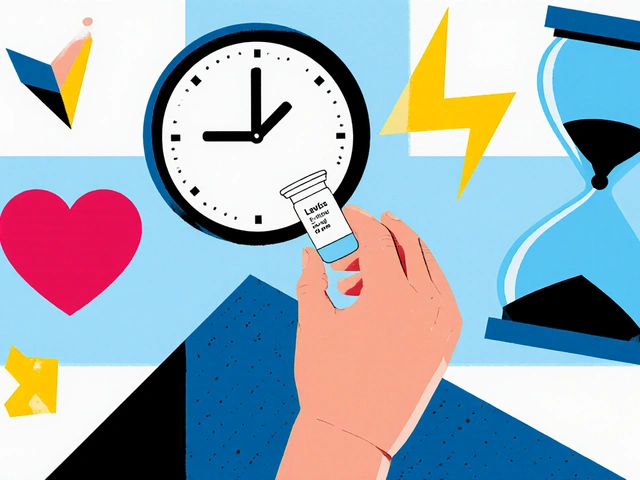Here’s something wild: a medication originally investigated for psychiatric treatment now helps thousands manage muscle spasticity every single day. Lioresal, better known in the medical community as baclofen, quietly sits in medicine cabinets of people with conditions like multiple sclerosis or spinal cord injury. But why all the fuss about this pill? And what should people know before taking it or caring for someone who does?
How Lioresal Works: Beyond Relaxing Muscles
The main action of Lioresal is actually inside the spinal cord. When nerves get noisy from conditions like MS or spinal cord injury, they send uncontrolled signals that make muscles contract or stiffen. Baclofen blocks these signals using something called GABA receptors. Imagine your brain yelling "relax!" at your muscles—that’s kind of what this medicine helps do, through a chemical shortcut. It doesn’t affect healthy muscle movement much, so you don’t end up feeling weak everywhere, which is a common fear.
It’s not just about treating severe cases. Doctors sometimes try Lioresal for persistent hiccups, painful spasms, or even certain bladder problems. Experimental research since the ‘70s also hinted at uses in alcohol dependence, but this isn’t standard practice yet. The real medical power of Lioresal comes from calming overexcited nerves, not directly from "relaxing" muscles. So, the effect can be dramatic for those who struggle to control muscle tightness in legs, arms, or torso.
Lioresal isn’t instant magic. It takes a few days to feel it working and full impact can take a week or more as the dose goes up. Doses start very low, often just 5 mg three times per day, then are slowly increased in 5 mg steps every three days or so. Most people land between 20-80 mg daily, split into two or three doses. High doses must be handled with care. Too much doesn’t mean faster or better results—instead, you can run into dangerous side effects.
Conditions Lioresal Can Help Treat
Doctors commonly prescribe Lioresal for muscle spasticity linked to neurological conditions. Here are a few key scenarios:
- Multiple Sclerosis (MS): Muscle stiffness, painful spasms, or tightness that interferes with walking or sitting are classic problems in MS, and baclofen is a front-line medicine there.
- Spinal Cord Injury: Spasms or cramps following trauma or disease are often treated with Lioresal.
- Cerebral Palsy (in Kids): Sometimes it’s the go-to for easing muscle stiffness and helping children move or get rest at night.
- Other Neurological Disorders: Stroke, traumatic brain injury, or certain rare metabolic conditions occasionally get baclofen on their prescription list when spasticity is stubborn.
Outside these main targets, Lioresal does pop up for less common uses, such as managing long-lasting hiccups or lower back pain when spasticity is the culprit. Always, it’s about giving people more comfort, better movement, or simply a more predictable daily routine.
Because baclofen doesn’t reverse nerve damage, it works best when there’s spasticity but still some healthy nerve control in the muscle. It can help with day-to-day activities—walking, dressing, or just turning over in bed—if spasticity is getting in the way. There are even cases where it’s used inside pump systems (see a bit later) for severe, treatment-resistant spasticity.
Side Effects and What to Watch For
No one likes talking about side effects, but it’s crucial—especially here. Baclofen can cause drowsiness, low energy, dizziness, or weakness. Some folks notice trouble concentrating or feel a bit foggy, especially right after a big dose increase. The more dramatic the dose jump, the higher the risk for these effects. Nausea and dry mouth pop up sometimes, as well as mild headaches. These side effects often die down as the body gets used to the medicine.
The big thing everyone should know: stopping Lioresal suddenly can bring on dangerous withdrawal symptoms—agitation, confusion, seizures, or even hallucinations. People have ended up in the hospital after running out or skipping doses for just a couple of days. Never stop without a plan to slowly reduce the dose over several weeks under medical supervision.
Rare and serious reactions do exist, too. Allergic reactions (like rash or swelling), problems urinating, or unusual heart symptoms mean you need urgent medical attention. People with kidney disease require careful dose adjustments. Some report changes in mood or depression, especially in teens or young adults. If someone feels very low or struggles with mood changes on baclofen, speak up early.
| Side Effect | How Common? | What To Do |
|---|---|---|
| Drowsiness | Very common | May improve after a week; avoid driving if severe |
| Dizziness | Common | Get up slowly from sitting/lying down |
| Muscle weakness | Common | May need dose adjustment |
| Nausea | Sometimes | Take with food |
| Withdrawal symptoms | Rare but serious | Never stop abruptly |
| Mood changes | Uncommon | Talk to doctor if you notice this |
For parents, teachers, and caregivers: watch for sudden mood changes or big drops in energy, especially when starting Lioresal or raising the dose. Older adults tend to be more sensitive, so doses might go up extra-slow.

Tips for Safe and Effective Use
There’s no shortcut here. Using Lioresal safely takes teamwork. Here are some real-world tips that make a difference:
- Start low. Doctors usually begin with a tiny dose and bump it up every few days. It’s tempting to speed things up, but slower is smoother.
- Stick to the schedule. Lioresal works best with evenly spaced doses. Missed doses can send muscle tone—and symptoms—on a mini roller coaster.
- Keep a simple symptom diary. Tracking spasticity, sleep, and side effects helps spot patterns. If you use a phone or notebook, share it at each doctor visit—it’s a goldmine for fine-tuning treatment.
- Take with food if you notice stomach upset, but avoid heavy meals that make you sleepy. Try to take it at the same times every day.
- Let family or friends know you’re starting this medicine, since you might feel extra sleepy at first.
- If you notice swelling, rash, trouble breathing, or a pounding heartbeat, get help fast. These aren’t common but need immediate attention.
- Never run out suddenly. If your prescription is getting low, arrange a refill well ahead. If you’re having side effects, don’t stop on your own—always get a taper plan from your doctor.
- Avoid alcohol and sedatives. Combining these with Lioresal can increase drowsiness—and risk of falls.
- If you drive or work with machinery, see how the medicine makes you feel before jumping right in. Reaction times can be slower at first.
- Store Lioresal in a cool, dry place, out of reach of kids. The tablets crumble easily if exposed to heat and moisture.
If side effects get in the way of daily life, sometimes changing the timing of the doses (like taking more at night) can help. Your doctor may also try smaller, more frequent doses or combine baclofen with physical therapy to help muscles stay loose without making you too tired. Therapists often recommend stretching routines to work along with the medication.
Lioresal Pump Implants and Other Delivery Options
If you’ve never heard of an intrathecal baclofen pump, you’re not alone. It’s a small gadget, like a hockey puck, that surgeons implant under the skin to drip Lioresal directly into the fluid around the spinal cord. This way, the medicine goes exactly where it's needed in tiny doses, limiting side effects out in the rest of the body. These pumps can make life much easier for those with severe, treatment-resistant spasticity—especially after spinal cord injury or in advanced MS.
Pump candidates go through a testing phase: doctors inject a trial dose to see if spasticity melts away without bad side effects. If it works, the pump is implanted under anesthesia. Dosages are programmed externally and get checked at monthly follow-ups. For families, the big advantage: there’s much less fatigue and confusion than with high-dose pills. But it’s not a set-and-forget solution. Pump refills, infection risk, and the rare chance of pump failure all need planning.
For most people, ordinary tablets do the trick. Some folks need liquid suspension (especially kids or those with swallowing problems), and new oral-dissolving forms are rolling out. No matter the version, steady and personalized dosing is the key.
Facts, Myths, and Frequently Asked Questions
Let’s bust a few myths and answer what people actually wonder about Lioresal:
- Myth: Baclofen causes permanent weakness.
Reality: It should not, if dosed correctly. If someone feels weaker, it’s usually dose-related and reversible. - Myth: It’s only for adults.
Reality: Lots of children with cerebral palsy benefit—and pediatric dosing is carefully calculated based on age and size. - Myth: Once you start, you can never stop.
Reality: Many people take Lioresal temporarily after an injury or during relapses. The main issue is to never stop suddenly. - Question: Can Lioresal help with pain?
Fact: Sometimes—especially if pain comes from chronic muscle spasm. - Question: Can I drink alcohol with baclofen?
Fact: Nope, not recommended. Both make drowsiness and falls more likely.
Doctors argue about whether Lioresal is addictive. Physical dependence is possible, which is why withdrawal can be harsh. But it doesn’t trigger cravings or compulsive use like opioids or benzodiazepines. Used as prescribed, it’s safe for the vast majority of people.
Some research suggests that when Lioresal is given by pump, hospitalizations and complications from spasticity drop by about 50%. Newer studies are exploring its effects on sleep, mood, and quality of life. For families and caregivers, the best strategy is to learn the signs of both improvement and trouble, keep the lines open with doctors, and never guess about dose changes or skipped pills.
Living with Lioresal is about gaining control over symptoms that can rob people of independence. Done right, it’s a steady partner—not a magic cure, but a tool that opens doors to better movement, rest, and daily life. If you or someone you know is considering Lioresal, don’t hesitate to ask questions, track changes, and make sure the care plan is as unique as the person taking the pill.







Alec McCoy
July 18, 2025 AT 16:46This article is a solid overview of baclofen and its uses in treating muscle spasticity. It's impressive how the post breaks down the side effects while also giving practical advice for patients and families—that’s crucial because understanding medication impact beyond just the physical symptoms can really change how patients comply with their treatment regimes.
One thing I always emphasize to people starting on any muscle relaxant like Lioresal is to closely monitor for any changes in mood or cognition. Baclofen’s influence on the central nervous system can sometimes be underestimated but it’s a real factor in overall patient well-being.
Also, the safety tips section should not be overlooked. I’d be interested if the author could dive deeper into what specific strategies families found most helpful in supporting their loved ones undergoing this treatment.
Does anyone here have experience helping family members on baclofen? Feel free to share insights or challenges you've encountered along the way.
KAYLEE MCDONALD
July 18, 2025 AT 22:20I really appreciate how straightforward this post is. Baclofen can be a tricky medication, especially because of its side effects and how it interacts with the body.
It’s important for patients to feel empowered to ask their doctors questions about what they’re experiencing, especially if side effects start affecting their daily lives. I also think families need as much info as possible to provide proper support, because sometimes symptoms can look like something else entirely.
People shouldn't ignore signs like excessive drowsiness or mood changes, which can be subtle but dangerous.
Thanks for covering this topic so clearly.
Aaron Perez
July 19, 2025 AT 05:16Well, medication like baclofen symbolizes the delicate relationship between modern chemistry and human physiology... don't you think? It’s fascinating how it affects the spinal cord to reduce muscle stiffness, yet it can simultaneously invoke side effects that are a form of double-edged sword.
One wonders if patients, armed only with surface-level information, truly comprehend the risks they undertake each time they swallow a pill. The article nudges us in the right direction but is it enough?
Sometimes I feel like society overlooks the philosophical implications of relying so heavily on these substances to 'fix' problems rather than addressing underlying causes.
Evan Riley
July 19, 2025 AT 12:13Hold on a minute, does anyone else think there's something more going on with drugs like Lioresal? Sure, the article covers uses and side effects, but I can't shake the feeling that these big pharma companies and their meds are a bit too neatly packaged.
Why do we barely hear about long-term side effects or alternative treatments? Makes me suspicious. There's usually a hidden agenda when information is this sanitized, right?
We really need transparency about how these drugs affect patients in the long run, including dependency potential.
Nicole Povelikin
July 19, 2025 AT 18:36While I recognize the value of this review on baclofen, I remain skeptical about some claims made regarding its safety. Most patients experience side effects differently, and I feel the article glosses over serious reactions that can occur.
Also, has anyone else noticed how the so-called 'safe use' guidelines seem copied and pasted from generic disclaimers? It’s almost like they want us to think all is well when some users report nightmare experiences.
Personally, I think we need a much more critical evaluation of these medications rather than cheerleading them.
Michelle Weaver
July 20, 2025 AT 04:53Thank you for this detailed, informative post on Lioresal treatment! 😊 The clarity about side effects and safety advice is definitely beneficial for patients starting baclofen therapy. 🙌
I would suggest always consulting with healthcare providers regularly and reporting all symptoms—some side effects may require dose adjustments. 😉
Families should also practice patience and provide emotional support since managing spasticity sometimes takes time to stabilize with medications.
Glad to see such practical advice disseminated! 💊
Graham Smith
July 20, 2025 AT 16:00The article is reasonably well-written but I must point out a few inconsistencies regarding medical terminology and dosage recommendations. Clarity and precision are critical in discussing pharmaceuticals, yet the text occasionally lacks that.
Furthermore, some sections seem vague about the actual risk incidences for side effects. More data would enhance trustworthiness.
Still, the general overview works as an introduction for non-experts, which is commendable.
Jeremiah Morgan
July 21, 2025 AT 04:30I want to add that ensuring adherence to baclofen treatment is vital for success. From what I’ve observed in clinical settings, many patients discontinue early due to side effects or fear of them, which undermines outcomes.
It can help if doctors and families closely communicate and encourage gradual dosage adjustments. Also, educating patients about the medication's purpose builds trust.
This post touches on those points nicely, and I hope more practitioners promote this level of awareness.
nina greer
July 21, 2025 AT 14:13Honestly, I found this guide kind of basic for anyone who's genuinely interested in the complexities of baclofen treatment. It lacks depth concerning pharmacodynamics and the nuances of patient-specific responses.
For those genuinely seeking to understand the medication beyond the surface level, I'd recommend consulting specialized medical literature.
Still, it’s adequate for beginner general knowledge.
Montague Tilmen
July 22, 2025 AT 18:00These days, you cannot be too careful with prescription drugs. This article makes it all seem rosy, but don’t forget the government's hand in pushing these medications on the masses.
We need to stay skeptical about the real motives behind these treatments and push for more natural, patriotic healthcare solutions.
Relying heavily on drugs like baclofen may just be another way to keep us docile, if you ask me.
William Mack
July 23, 2025 AT 21:46Interesting perspectives all around! From what I know, baclofen acts primarily as a muscle relaxant targeting certain nervous system receptors to alleviate spasticity. It’s widely used globally with varying protocols depending on healthcare systems.
Has anyone noticed differences in availability or patient support from different countries? Cultural attitudes might shape how patients perceive such treatments and adhere to them.
Sharing your local experience could add valuable insight to this conversation.